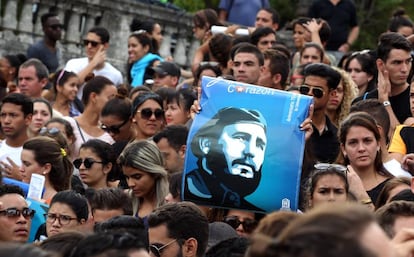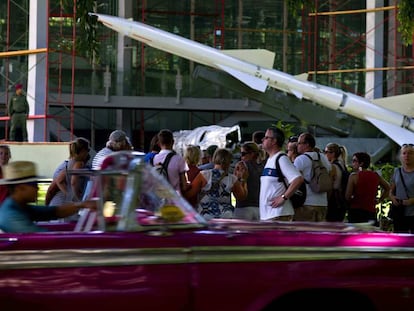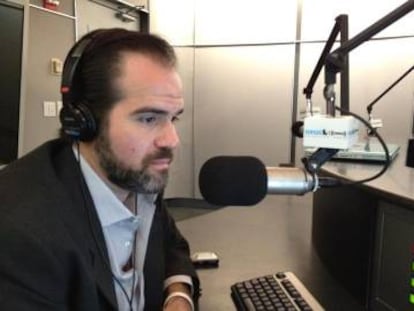With the death of Fidel Castro, Cuba bids definitive farewell to the 20th century
The passing of the founder of the Cuban Revolution closes a chapter in the history of Latin America

Fidel Castro, the man who changed the history of Cuba with a socialist revolution that pitted the country against the United States for half a century, died on Friday night in Havana. His passing at the age of 90 signifies the disappearance of the most influential political figure of the 20th century in Latin America, a man who was as praised as he was demonized during his long and turbulent life. Having stepped back from power in 2006 due to illness, he retained a symbolic presence as part of the regime he had established in 1959, despite his age and weakness. But now, Fidel, as he was known to millions around the world, is gone. Cuba will move forward without him for the first time in six decades. The future that awaits, whether a hybrid model of single-party capitalism, pluralism under a hegemonic party, or a transition toward democracy, is impossible to predict.

Since stepping back from power, his brother, Raúl Castro, 85, has led the country. The president and head of the armed forces announced the death of Fidel in a televised message, which he began with a trembling voice. “With a heavy heart I am speaking to you to inform our people, the friends of our America and the world, that today, November 25 at 10.29pm, the Commander in Chief of the Cuban Revolution has died.” As the news spread, bars and nightclubs closed, and even the iconic Malecón seafront was deserted as people headed home. The few people who stayed out and were prepared to discuss events spoke of Castro as a “respected” figure. They were sad but made little fuss. “Losing Fidel is like losing a father, a guide, the lighthouse for our revolution,” said Michel Rodríguez, a 42-year-old baker in statements to France Presse.
With Fidel Castro’s passing, the last vestige of the Cold War has expired
“We were expecting it, but it is still a surprise,” said Havana University history professor Enrique López Oliva, aged 80. “This marks the end of an era and the start of another, one that to ordinary people will speed up the process of change,” he added.
While there was praise for Castro in Cuba, at least in public, in Miami, the heart of the anti-Castro movement, people came out on the street to celebrate after hearing the news. Little Havana, a historic stronghold for opposition to the Revolution, took on a carnival atmosphere as. Waving Cuban flags, banging pots, pans and drums, they cried: “Long live a free Cuba!”
The death of Castro also prompted reaction from leaders around the world. The outgoing US president, Barack Obama, the architect of his country’s thaw with the island, offered a measured response, preferring to hold out a hand to the Cuban people. His successor, President-elect Donald Trump, described Castro as a “brutal dictator”, signalling his intention to bury the rapprochement begun by Obama.
From Venezuela, the main ally of Cuba in Latin America, President Nicolás Maduro urged the “revolutionaries of the world” to follow the legacy of Castro, while the Chinese leader, Xi Jinping, said that the Chinese people “had lost a close comrade and dear friend.”
On Saturday morning the streets of Havana morning were strangely empty and quiet
Following Castro’s death, the Cuban government declared nine days of mourning. His ashes will be taken from the capital after a procession across the island to Santiago de Cuba, where they will be interred alongside the remains of José Martí, the hero of the War of Independence against Spain, and who Castro considered his predecessor.
On Saturday morning the streets of Havana morning were strangely empty and quiet, according to the Cuban online daily 14 y medio, and absent of the usual cigar sellers, children playing, or queues to buy a newspaper. Leticia Rodríguez, who runs a boarding house, explained via telephone that the death of Castro was the only subject people were talking about. “Even his critics are shaken. But everything is calm, we are now waiting for the funeral ceremonies.”
Spanish news agency EFE reported that a number of students had gathered at the University of Havana to pay tribute to Castro where he used to say he had become a revolutionary,. “We have lost our historic leader, one of the pillars of Latin American and the Caribbean,” explained Nelson Ayala.
Following Castro’s death, the Cuban government declared nine days of mourning
With Fidel Castro’s passing, the last vestige of the Cold War has expired. The one-time partner of the Soviet Union, who allowed Moscow to install nuclear missiles aimed at the United States, is gone. So too the leader who repelled the CIA-coordinated Bay of Pigs invasion, and the propagator of revolutions around the world and who withstood 11 occupants of the Oval Office.
Cuba must now say goodbye to the leader who took it to the extremes of human experience – from the the triumph of the Revolution and the misery of the Special Period, to the years of hunger after the Soviet Union collapsed.
Raúl Castro, the right-hand man of Fidel from the days of combat in the mountains against the forces of dictator Fulgencio Batista, will continue as president until 2018, when he has promised to step down. He will, however, continue to be general secretary of the Cuban Communist Party until 2021. If his health holds up, he will guide the process by which the island will open up to the rest of the world. After that, Vice-President Miguel Díaz-Canel looks set to take over. A former education minister, he is seen as a moderate.
Now, Fidel, as he was known to millions around the world, is gone
It is unclear how relations with the United States will progress once Donald Trump takes office in January. The president-elect has already said he intends to reverse the policies of the outgoing president, demanding that Havana allow political freedom before bilateral relations can established. But the momentum created by Obama, driven in large part by US business interests and widespread public support for improved relations between the two countries, could stymie Trump’s demolition plan.
During his last appearance before the Cuban Communist Party conference, in April, the leader of the Cuban Revolution said goodbye to the people who he had schooled in his own particular way. “Soon I will be just like everyone else, everyone gets their turn,” he said. “But the ideas of the Cuban communists will remain.”
Fidel Castro will leave a lasting impression on Cuba, and will be the object of lively debate for decades to come. But the Commander-in-Chief has passed away, and Cuba now finds itself, definitively, facing up to the realities of the 21st century.
English version by Simon Hunter.
Tu suscripción se está usando en otro dispositivo
¿Quieres añadir otro usuario a tu suscripción?
Si continúas leyendo en este dispositivo, no se podrá leer en el otro.
FlechaTu suscripción se está usando en otro dispositivo y solo puedes acceder a EL PAÍS desde un dispositivo a la vez.
Si quieres compartir tu cuenta, cambia tu suscripción a la modalidad Premium, así podrás añadir otro usuario. Cada uno accederá con su propia cuenta de email, lo que os permitirá personalizar vuestra experiencia en EL PAÍS.
En el caso de no saber quién está usando tu cuenta, te recomendamos cambiar tu contraseña aquí.
Si decides continuar compartiendo tu cuenta, este mensaje se mostrará en tu dispositivo y en el de la otra persona que está usando tu cuenta de forma indefinida, afectando a tu experiencia de lectura. Puedes consultar aquí los términos y condiciones de la suscripción digital.










































